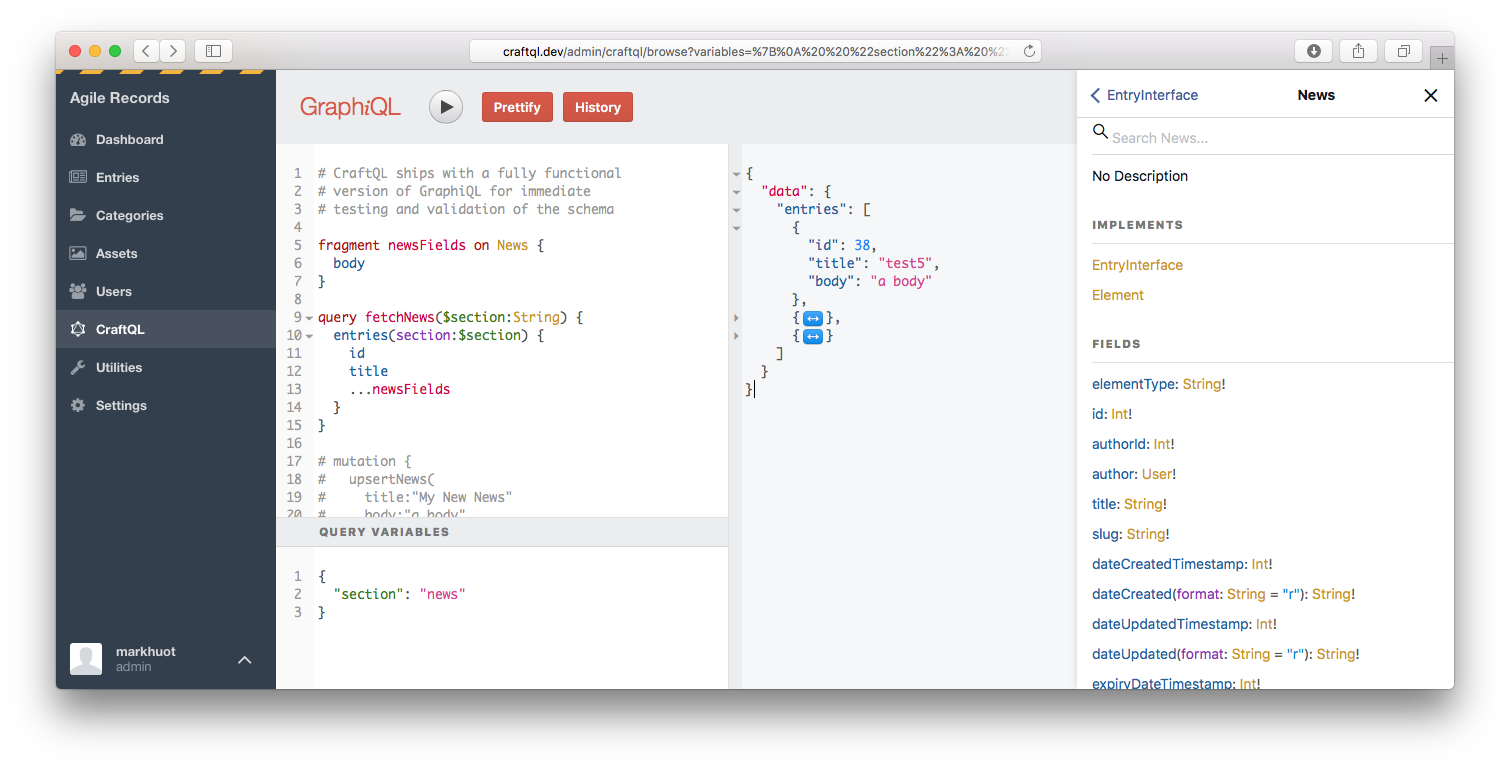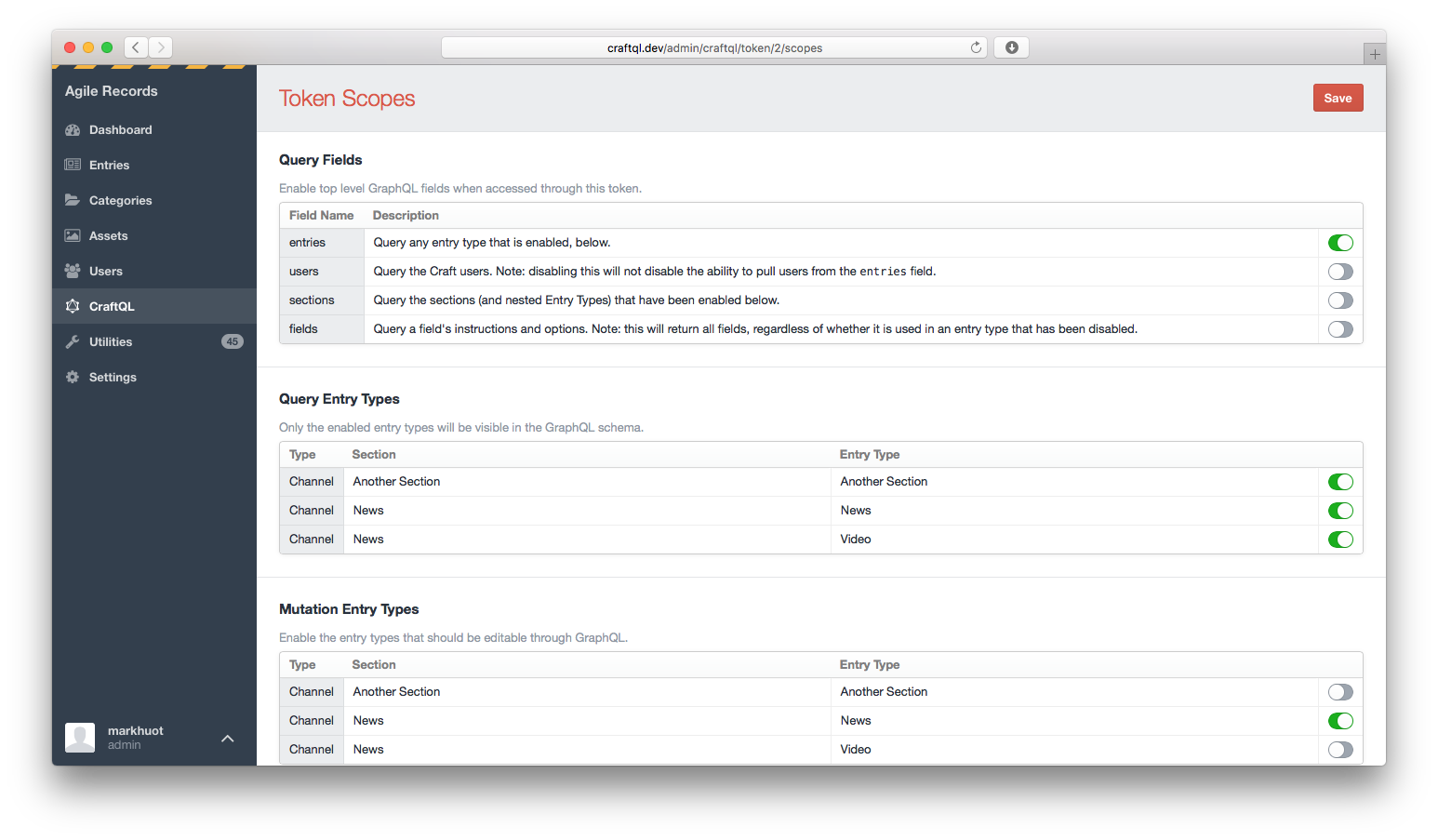A drop-in GraphQL server for your Craft CMS implementation. With zero configuration, CraftQL allows you to access all of Craft's features through a familiar GraphQL interface.
Note:, this plugin may or may not become a paid add-on when the Craft Plugin store becomes available. Buyer Downloader beware.
Once installed, you can test your installation with a simple Hello World,
{
helloWorld
}If that worked, you can now query Craft CMS using almost the exact same syntax as your Twig templates.
{
entries(section:[news], limit:5, search:"body:salty") {
...on News {
title
url
body
}
}
}CraftQL provides a top level entries field that takes the same arguments as craft.entries does in your template. This is the most commonly used field/access point. E.g.,
query fetchNews { # The query, `query fetchNews` is completely optional
entries(section:[news]) { # Arguments match `craft.entries`
...on News { # GraphQL is strongly typed, so you must specify each Entry Type you want data from
id # A field to return
title # A field to return
body # A field to return
}
}
}Types are automatically created for every Entry Type in your install. If you have a section named news and an entry type named news the GraphQL type will be named News. If you have a section named news and an entry type named pressRelease the GraphQL type will be named NewsPressRelease. The convention is to mash the section handle and the entry type handle together, unless they are the same, in which case the section handle will be used.
query fetchNews {
entries(section:[news]) {
...on News { # Any fields on the News entry type
id
title
body
}
...on NewsPressRelease { # Any fields on the Press Release entry type
id
title
body
source
contactInfo
downloads {
title
url
}
}
}
}To modify content make sure your token has write access and then use the top level upsert{EntryType} Mutation. upsert{EntryType} takes arguments for each field defined in Craft.
mutation createNewEntry($title:String, $body:String) {
upsertNews(
title:$title,
body:$body,
) {
id
url
}
}The above would be passed with variables such as,
{
"title": "My first mutation!",
"body": "<p>Here's the body of my first mutation</p>",
}All Dates in CraftQL are output as Timestamp scalars, which represent a unix timestamp. E.g.,
{
entries {
dateCreated # outputs 1503368510
}
}Dates can be converted to a human friendly format with the @date directive,
{
entries {
dateCreated @date(as:"F j, Y") # outputs August 21, 2017
}
}Related entries can be fetched in several ways, depending on your needs.
Similar to craft.entries.relatedTo(entry) you can use the relatedTo argument on the entries top level query field. For example, if you have a Post with an ID of 63 that is related to comments you could use the following.
{
entries(relatedTo:[{element:63}], section:comments) {
...on Comments {
id
author {
name
}
commentText
}
}
}Note, the relatedTo: argument accepts an array of relations. By default relatedTo: looks for elements matching all relations. If you would like to switch to elements relating to any relation you can use orRelatedTo:.
The above approach, typically, requires separate requests for the source content and the related content. That equates to extra HTTP requests and added latency. If you're using the "connection" approach to CraftQL you can fetch relationships in a single request using the relatedTo field of the EntryEdge type. The same request could be rewritten as follows to grab both the post and the comments in a single request.
{
entriesConnection(id:63) {
edges {
node {
...on Post {
title
body
}
}
relatedTo(section:comments) {
edges {
node {
...on Comment {
author {
name
}
commentText
}
}
}
}
}
}
}Drafts are best fetched through an edge node on the entriesConnection query. You can get all drafts for an entry with the following query,
{
entriesConnection(id:63) {
edges {
node { # the published node, as `craft.entries` would return
id
title
}
drafts { # an array of drafts
edges {
node { # the draft content
id
title
...on Post { # draft fields are still referenced by entry type, as usual
body
}
}
draftInfo { # the `draftInfo` field returns the meta data about the draft
draftId
name
notes
}
}
}
}
}
}CraftQL supports GraphQl field level permissions. By default a token will have no rights. You must click into the "Scopes" section to adjust what each token can do.
Scopes allow you to configure which GraphQL fields and entry types are included in the schema.
No software is ever done. There's a lot still to do in order to make CraftQL feature complete. Some of the outstanding items include,
- Matrix fields are not included in the schema yet
- Table fields are not included in the schema yet
- Asset mutations (implemented by passing a URL or asset id)
- File uploads to assets via POST $_FILES during a mutation
- Automated testing is not functional yet
- Automated testing doesn't actually test anything yet
- Mutations need a lot more testing
-
relatedTo:improvements to take source/target - Persisted queries
- Craft 3.0
- PHP 7.0+
If you don't have Craft 3 installed yet, do that first:
$ composer create-project craftcms/craft my-awesome-site -s betaOnce you have a running version of Craft 3 you can install CraftQL with Composer:
$ composer require markhuot/craftqlCraftQL ships with a PHP-native web server. When running CraftQL through the provided web server the bootstrapping process will only happen during the initial start up. This has the potential to greatly speed up responses times since PHP will persist state between requests. In general, I have seen performance improvements of 5x (500ms to <100ms).
Caution: this can also create unintended side effects since Craft is not natively built to run this way. Do not use this in production it could lead to memory leaks, server fires, and IT pager notifications :).
php craft craftql/server

